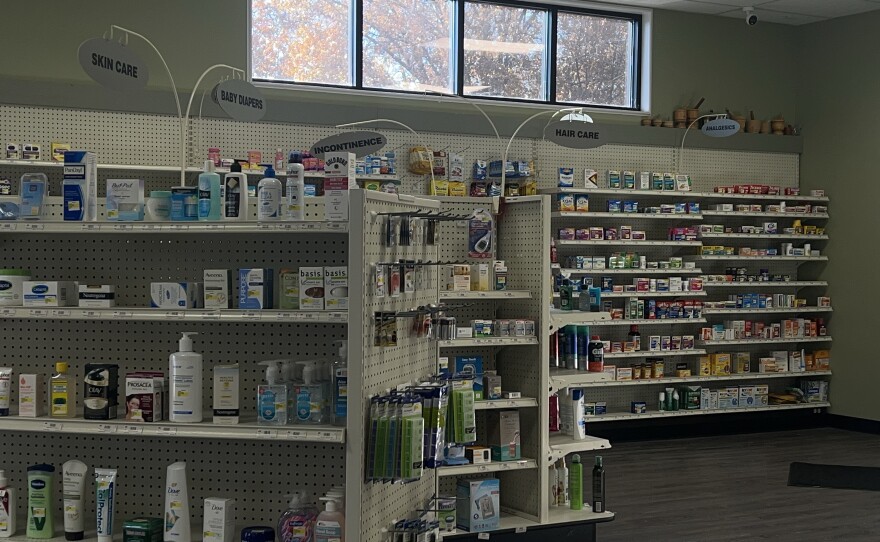Pharmacies across the U.S. have been transferring prescriptions, advertising closing sales and shutting their doors.
Among them, some of the biggest chains have enacted mass closures. CVS, Walgreens and Rite Aid, have announced over 2,500 store closures nationwide.
Between 2010 and 2021, a third of U.S. retail pharmacies have closed, according to a study recently published by UC Berkeley and the University of Southern California.
Jason Dorsey bought Roselawn Pharmacy in Cincinnati four years ago. The Good Neighbor Pharmacy location on Reading Road has served the neighborhood since 1940.
“It's been tight from an economic perspective,” Dorsey said. “But I'm not worried about trying to make millions of dollars. I make less than I would if I were at a retail pharmacy. But I love what I do.”
Dorsey said he makes less than a dollar from the sale of a prescription. Often, not enough to cover the cost to stock the drug, or the vial they dispense it in.
“You would think the more prescriptions you fill, the better off you would be,” Dorsey said. “The more business you get, the better you would be.”
“There's a lot of balance between taking losses on certain medications and hoping that those losses are covered.”
David Burke, the CEO of the Ohio Pharmacists Association, said this has become the reality for many pharmacies.
“With even a 10 or a 20% increase in business, which the average person would say, ‘That's awesome, that's a good thing.” In the case of independent pharmacy, that could actually be a bad thing where it puts you closer to going out of business,” Burke said.
The pharmacy industry has taken no shortage of hits: prescription delivery services, competition from retail giants, massive settlements from the opioid crisis, and rising business expenses have all hacked away at pharmacy revenue.
But, Burke blames Pharmacy Benefit Managers or PBMs for recent mass closures. Most health insurers hire PBMs to manage their pharmacy benefits.
“PBMs control both the reimbursement to the pharmacy and the charge to the insurer,” Burke said. “It'd be the same story as if Visa or Mastercard owned the store that you shopped at and didn't tell you the price of what you were buying until you got your monthly statement. I think you'd be very concerned about Visa and Mastercard.”
Pharmacies are compensated for dispensing medications through reimbursements: PBMs pay a “dispensing fee” to pharmacies like Roselawn.
Those are sent after the fact in monthly aggregate amounts, Dorsey said in seemingly random sums that are irreconcilable.
“We're sort of at the mercy of the insurance companies to just accept it and do the best you can,” Dorsey said.“There's a lot of balance between taking losses on certain medications and hoping that those losses are covered.”
PBM practices have come under scrutiny in recent years: Ohio’s attorney general and the FTC have both investigated.
Those reports accuse PBMs of keeping too much of the money they manage and paying pharmacists too little.
The FTC launched their investigation into PBM practices in 2022. It has since found that six PBMs control over 95% of the prescription market.
PBMs have pushed back. They emphasize their role in limiting price gouging by big pharma. For the closures, they point to many other business pressures facing pharmacies.
Big drug store chains have tried to diversify revenue through mergers and product expansion. Some opened health clinics.
CVS bought insurer, Aetna, and its own PBM, CVS caremark.

At Roselawn Pharmacy, Dorsey opened a clinic and hired an in-house nurse less than a year ago. Revenue from it has helped cover the cost of selling prescriptions.
“That creates some revenue from the leasing of the space. And, then those prescriptions that then would backfill into the pharmacy itself,” Dorsey said.
Dorsey worked at a pharmacy owned by a chain down the road from Roselawn earlier in his career.
“When I first started, we didn't get lunches. You ate while you worked, trying to keep up with the volume so that it would balance out with the lower reimbursements that the chains were starting to see,” said Dorsey.
“If I need to drive two or three miles, it's not a big deal. But so many of my patients walk or take public transportation, or are in assisted living homes and can't get out at all.”
That store down the road has since closed. Roselawn is the only pharmacy in a three mile radius.
“If I need to drive two or three miles, it's not a big deal. But so many of my patients walk or take public transportation, or are in assisted living homes and can't get out at all,” Dorsey said.
Roselawn serves a community of around 14,000 patients, many of them low-income.
Though many of his drug reimbursements barely cover the cost of materials, Dorsey’s pharmacy will deliver prescriptions.
“We try and go to them when we can. None of these extra services in today's current state are covered as extra. You don't get paid to go to someone's home” Dorsey said.
But, he’s not just in it for the money.
“I love seeing these people every day,” Dorsey said. “I've got my work grandparents and my work aunts and uncles: people I care about just like family. And it comes with its own ups and downs.”




